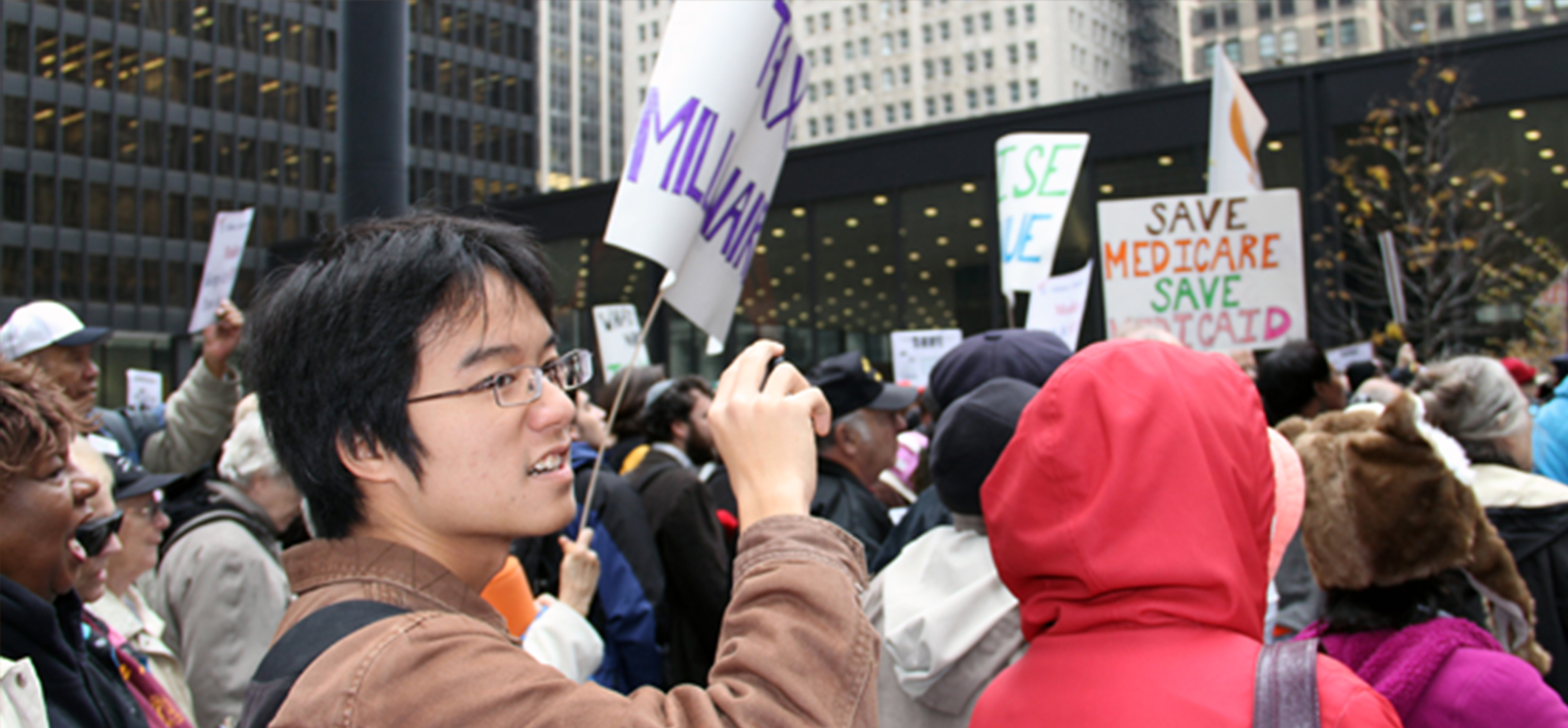
(Photo by Ruth E. Kott, AM’07)
This fall fourth-year Kelvin Ho spent his days not in class but on Occupy Chicago’s front lines.
“There’s a bunch of senior citizens who want to get arrested today,” Kelvin Ho, ’12, told me at a November 7 rally in Chicago’s Federal Plaza. Hundreds of people had gathered that morning outside Senators Dick Durbin’s and Mark Kirk’s offices to protest Social Security, Medicare, and Medicaid cuts. Ho was documenting the rally for Occupy Chicago’s live feed.
An Occupy Chicago protestor since the movement came to the city in September, Ho had been involved with a South Side community organization, Southsiders Organized for Unity and Liberation (SOUL), since March 2011. SOUL had been “trying to target for more national issues having to do with bank accountability.” Even before Occupy Wall Street picked up steam, he says, “we were already talking about similar issues.”
He spoke with the Magazine in early November, about two weeks after he and Paul Kim, ’14, were arrested at a SOUL-organized sit-in affiliated with Occupy Chicago.
What happened at the sit-in?
I was not intending to get arrested. There was a planned action—there was a Mortgage Bankers Association conference at the Hyatt Regency. Originally 14 of the members had decided to stage an action there, basically a sit-in in the hotel, where we set up sort of a mock living room. The idea is that, when the police come tear it down, it symbolizes the foreclosure process. This is a very diverse group of pastors, students, all sorts of individuals that were part of SOUL.
I was there to record and film the action and also coordinate some other logistics. I guess I started looking suspicious, and one of the security people told me to leave, and I stayed. Apparently once they tell you to leave, and you don’t, it counts as trespassing, so I ended up getting arrested.
How did the police treat you?
A lot of them were very supportive and actually thanked us for what we were doing. There was one incident—one of the people who had participated in the action had chosen to go limp, which basically means [the police] have to carry you out, and, in a sense, that aggravates certain police officers. So one in particular was a little rough with him. No one really wants to carry another guy out.
When did you get involved with Hyde Park community organizations?
Since high school [at an international school in Taiwan], I was very involved in community service. I spent most of my time doing community service rather than in school. But my first few years of college were unsatisfactory. Deep down, I had hoped that when I came to college I’d be able to address many problems that I sort of touched upon back in high school on a larger scale and in a more effective manner. I felt limited, but when I studied abroad in India last autumn, that experience opened my eyes up a lot. One of the larger realizations was that, as one of my professors put it back in India, things are just sanitized here in America. There are many similar problems that occur here, but they are just sort of institutionalized in ways that might not be as apparent.
What attracted you to Occupy Chicago?
I recognize the serious limitations of various community organizations, and that’s what then drew me into the Occupy movement. You have this new form of grassroots movement that has the ability to draw upon people from so many different backgrounds and to reenergize these people in a way such that people finally feel that they have the ability to do something about all the problems that they’ve been seeing for the past decade.
What are the problems at the heart of the movement?
I think it’s no accident that the theme of complete political control by the financial industry or corporate control of our political system has become the core theme. In a sense, that’s what underlies the issues of health care, education, housing, and all the various other issues people have been talking about. I think a lot of pundits are saying, “We want a very specific thing that you can pass through Congress,” but the reality is the problem is inherent in the system, and several changes need to occur in order to change that. And it’s not going to happen with just one magical bill that you can pass through Congress.
